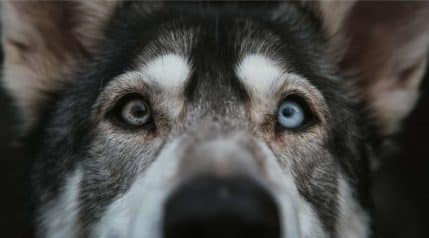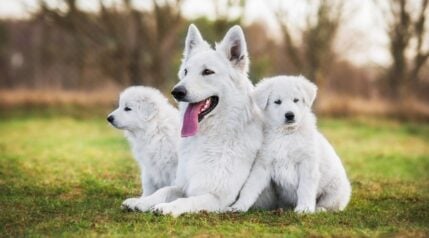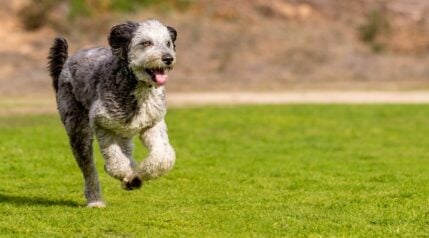Have you heard of the Huskador dog or the Siberian Retriever? This lovely mixed breed dog blends the Siberian Husky and Labrador Retriever to create a lively, cute pup. The Husky Lab mix is an energetic, medium-sized pup that can make an enthusiastic companion. Could this designer doggy be the right fit for your family?
Huskadors are growing in popularity, especially as service dogs. The Labrador Husky mix has two very intelligent parents and is quite clever, friendly, and eager to please. Along with that, they can be very gentle and get along well with other dogs and children.
When taking on a hybrid dog, it can be helpful to consider the traits of both breeds within the mix, as you will likely end up with a dog that shows characteristics from both. Jump in with us and get to know the adorable and unforgettable Husky Labrador mix known as the Huskador.
Breed Histories
Though there is no way to know exactly what traits a mixed-breed dog will inherit, getting to know more about each of the parent breeds is a good start. Remember that mixed breeds have some unpredictability in both appearance and personality. Depending on the dominant genes, they may look and act more like one parent or be a true mix of both.
Siberian Husky

Siberian Huskies are thought to be one of the oldest dog breeds around, originating from the vast Arctic expanses of Siberia. Similar to the Malamute, Huskies were companions and working animals that helped with transportation and provided warmth and companionship for tribe families.
They were predominantly used as sled dogs by prospectors in the Gold Rush era. They were hard workers during the day and cuddly companions at night. Huskies were admired for their sturdy build and ability to navigate tough, frozen terrain.
These pups gradually started to grow in popularity and numbers due to their charming personalities and striking looks. Siberian Huskies were recognized as an official breed by the American Kennel Club in 1930. They were initially often referred to as the Arctic Husky before being renamed the Siberian Husky.
Siberian Huskies stand out for their wolf-like appearance. They have a thick double coat, erect pointy ears, almond-shaped eyes, and a narrow nose. Huskies often look like they are smiling due to their facial features. Their tails are curvy and often used to keep their noses warm. Huskies can have coats of varying color and often have brightly colored eyes, sometimes of two different colors. They range in size from 35 to 60 pounds and stand between 20 to 24 inches tall, paw to shoulder.
Labrador Retriever

The Labrador Retriever, like the Husky, is one of the most popular companion animals. So much so that they have consistently ranked as one of the most popular breeds in the United States for the last few years.
Originally, Labs were bred as working dogs. They are often associated with being from England, but although this is where the breed was developed for its skills as a waterfowl retriever, they originally came from Newfoundland (not the nearby Labrador, as you would think the name would indicate). Here, they worked on fishing boats and assisted the men with the hauling of nets and catching fish that escaped the lines.
The American Kennel Club recognized the breed in 1917, and their popularity grew over the decades. Their temperaments and intelligence mean that they not only appeal as a companion, but Labs also make fantastic service dogs. They often work as support dogs, scent detection dogs, and for search and rescue, among other working roles.
Labrador Retrievers have a sturdy build, reaching between 55 to 80 or more pounds when fully grown. They stand between 21 and 24 inches tall. Labs have friendly, broad faces with floppy ears and gentle eyes. They have otter-like tails and short double coats that are resistant to water.
Appearance

You can expect a medium to large dog between about 40 and 75 or so pounds. They will stand between 20 and 25 inches tall at the shoulder. The specific size will depend on their parent’s genetics and what traits they inherit. You will also have a dog with a short, dense double coat, as both parent breeds sport this coat type.
The color will vary from dog to dog. Labs tend to come in three solid color options: chocolate, black, and yellow. Huskies are commonly a white-grey mix, but they can come in black or white solid colors and other mixed color combinations, too, including brown and white, red and white, and sable and white.
Huskies have pointed pricked ears, and Labs have drop ears, so you could end up with either an unusual shape or position that is somewhere in between. Appearances may vary, though, depending on the dog, similar to other Labrador mixes like the Aussie Shepherd and Lab mix. Huskies are also commonly mixed with other dogs, like the Husky Golden Retriever.
Personality Traits
While both breeds are known for generally being affectionate, they have quite different personalities. You must be ready for your dog to take on temperament traits from either of the breeds. It is also important to remember that every dog is an individual, and they will not always match a breed’s reputation. Early and ongoing socialization and training can have a huge influence on shaping your dog’s personality.
Labradors are famous for being incredibly smart, exceptionally friendly, and eager to please dogs. If someone asks which breed would make a good family pet, this breed is often at the top of the list. Labs usually love the company of people, and often other dogs too, and are energetic and playful. Huskadors should be taught good manners around people and other dogs.
Huskies are extremely energetic and driven, and they are not dogs that do well with apartment living. They also often have a high prey drive, so Husky mixes may not be best suited to living with other small animals.
Neither parent breed is known for being guard dogs or territorial. If you are looking for a dog that will be a good watchdog, you are not likely to get this in a Husky Lab Mix.
Training
Both breeds are very smart dogs that enjoy working. Without appropriate mental stimulation and direction, problem behaviors can start. You must start obedience training at a young age to set expectations and habits for proper long-term behavior.
They are both dogs that thrive on interaction. If left too much on their own, they can be prone to developing separation anxiety. Huskies are often a very vocal breed and, if left on their own, may drive your neighbors to distraction with their howling. Training is helpful to encourage them not to vocalize so readily. Husky and Husky mixes must always be rewarded for quiet behavior. Even if you think it’s cute, don’t encourage your dog when they start howling.
Labradors, in particular, are heavy-duty chewers. You should make sure they have a wide selection of tough, interactive chew toys. You must redirect them when you notice them showing interest in a table leg or slipper. The Huskador needs regular mental stimulation like toys, games, and one-on-one playtime with you.
Huskies are not good to let off the leash unless they have a lot of training. They are often given the nickname of Houdini due to their amazing ability to escape. Their scaling and digging skills are exceptional. You may need a high-fenced yard to ensure your Husky Lab mix cannot dig underneath the fence to escape. if the behavior becomes problematic, consider a session with a professional animal trainer, either online or in person.
The intelligence of both breeds means that any training you do will be extremely worthwhile. They are both fast learners and respond well to positive reinforcement training. The Lab, in particular, is extremely eager to please and very food-motivated.
Exercise
With their working histories, both breeds are generally very active and high-energy dogs. You are not likely to end up with a lazy couch potato, and you should expect to provide them with good daily walks and plenty of extra enrichment around the home and neighborhood. Huskies, especially, have very high energy, and they really do benefit from living in an active household where they can get the opportunity for long walks or runs regularly.
Expect to walk your Huskador twice a day for at least 30 or more minutes each walk. They need a lot of opportunities to run and burn off that energy, or they will start to get destructive in your house. This is a perfect breed for taking on hikes, swimming, and long jogs.
They are both breeds that may excel in competitive dog sports. Labs are frequent winners on the agility circuit, and Huskies make excellent Canicross dogs (the sport of running with your dog pulling out front).
Grooming
With the Husky Lab mix, you need a vacuum cleaner designed to be effective at lifting out dog hair from carpets. They are both prolific shedders, particularly when they have their seasonal molt. If you don’t want to clean hair from your clothes and soft furnishings continually, this is probably not a mix for you.
You will also need to invest in a good de-shedding tool, like the Furminator, and they will need daily brush-outs during molting season and at least a weekly groom at other times. This will not only help to minimize the number of hairs left around your home and car, but it will also help to keep their coat in good condition.
Labradors are known for their love of water. They can quickly develop that infamous “wet dog smell,” so they may need more regular bathing. Ideally, they need a bath only once a month, as overbathing can strip the natural oils from their coats.
Huskies, on the other hand, are famous for their fastidious cleanliness. Their thick coats do not hold dirt and odors the way a Labrador’s coat does.
Health

Some things can be out of your control when it comes to inheritable conditions. That said, mixed-breed dogs are often healthier than their purebred parents due to a greater genetic diversity. Huskadors have a life expectancy of 10 to 15 years on average.
If you are buying a Husky Lab Mix from a breeder, you should make sure they have done the relevant health screens on the parents, and this can help minimize the risk of your dog developing some of these genetic conditions.
Labrador Retriever Health
Musculoskeletal and Joint Problems: Arthritis is one of the biggest health conditions for Labradors. While this may not be avoidable, there are things that you can do to help reduce the risk and slow down the development. Using a joint supplement containing glucosamine and fish oils may help, as can making sure they don’t over-exercise as a puppy and not encouraging high-impact exercise regularly.
They can also be prone to elbow and hip dysplasia. Surgery or other treatment may sometimes help manage these conditions. Osteochondrosis Dissecans (OCD) is another common condition in Labs, especially in the elbows. This impacts how the cartilage is growing in the joints, and, in extreme cases, it can stop the elbow from being able to move.
Eye Problems: Labs are also at risk of developing cataracts and Progressive Retinal Atrophy (PRA). PRA is not treatable, and it will lead to eventual blindness. Parents can have health screenings for this condition.
Bloat: Also known as Gastric Torsion or, by its medical name, Gastric Dilatation Volvulus (GDV). This can be potentially fatal if immediate veterinary treatment is not sought. The condition results in the stomach expanding and twisting, and it can lead to a whole host of internal complications and extreme pain and distress for your dog. While the exact causes are still not fully understood, it is widely recognized that larger breeds with deep chests are more likely to be at risk.
Labs also face an increased risk of developing epilepsy, heart problems, and a muscle-weakening condition called hereditary myopathy.
Husky Health
Hypothyroidism: This condition causes a dog to have a decreased metabolic rate as a result of a thyroid that is underactive. This can mean that the dog will start to gain weight more rapidly, their coat and skin condition may deteriorate, and they could become listless and fatigued. Hypothyroidism has no cure, but it can be managed through medication.
Follicular Dysplasia: This is a condition that occurs at an early age, around three or four months. It is commonly associated with Huskies, and unfortunately, there are no effective treatments. It can result in a change in the condition and color of the dog’s coat, and they can suffer from hair loss.
Like Labs, Huskies are also more prone to developing cataracts, PRA, and hip dysplasia.
Nutrition
As with any dog, it is important that you feed high-quality food to your Lab Husky Mix.
Labs are prone to obesity. Not only are they infamous overeaters, but there may even be a genetic link to their weight gain problems. You should be very careful not to overfeed them, and this is especially relevant when they are a puppy as this can contribute to an increased chance of them developing Osteochondritis Dissecans when they mature.
Because of the Huskador’s increased risk of bloat, it is better to feed them smaller meals more often rather than one large meal a day. If they hoover their food down very quickly, they may also benefit from being fed from a slow feed bowl.
If you do have an exceptionally active dog, perhaps they have the Husky trait of loving to run, and you regularly take them on Canicross sessions, you need to make sure that they are getting appropriate food that can support their additional energy requirements.
Breeders & Puppy Costs

We would always encourage you to consider dog adoption. It can be a truly rewarding thing to do, and you will be providing a much-needed home to a dog in need.
If you do want to buy a puppy, it is vital that you do your research. Because a Husky Lab Mix is not a recognized breed, there will be no accredited breeders. You should make sure that whoever you are considering buying from allows you to come to visit Mom and her litter, and they should be in a home environment with access to an appropriate whelping pen. Breeders should get initial veterinarian exams, as well as provide documentation of health screenings.
A healthy Huskador puppy can cost anywhere from $300 to $800 or more. The price depends on the breeder, parent pedigree, time of year, and age of the puppy.
Because of the rise in popularity of certain mixed breed dogs, often referred to as “designer” breeds, has seen a surge in the number of unscrupulous backyard breeders and puppy mills that are cashing in on the trend. Not only can you end up with a sick, under-socialized puppy, but you are promoting a practice that sees breeding dogs often kept in cruel, inhumane conditions.
What To Consider Before Adopting A Dog
Bringing a dog into your home and life is an amazing and rewarding process. A Husky Lab mix can be a great fit for the right home. Being a dog parent is a huge joy but also a big responsibility. Before welcoming any pup home, you must be sure you have the time, energy, physical space, and budget to support your pup. Ask yourself these questions, and discuss the decision with family members who will be in the home and part of the process. It is especially important to work with children in the home to understand how to properly interact with and care for a new pup.






I was a breeder of Labs for many years. Typically, they all passed away at about 12 years Then I broke down and purchased a Huskador. Awesome dog. Dallas is all that they say, loyal a bit stubborn to train, and loves the outdoors. If she doesn’t get a long walk every day, she’s not a happy camper. She is a great dog and a really people loving dog.
Hi there. My lab/husky mix just passed. If you have any information on getting another it would make my heart full.
Hey Jacqueline, I’m very sorry to hear about your loss! We lost our Labrador last year and it was extremely tough on our family. Before looking for a lab/husky mix at a breeder, have you looked at local rescues? We always start our search at the rescues locally.
You’ll likely have a shot at finding a Huskador at a Husky rescue or a Lab rescue as most take mixes. I’d also check the local humane society and/or city animal shelter. We don’t have any breeders that we specifically work with, so I’d recommend looking at social media channels as well. Sorry for your loss and good luck in your search!